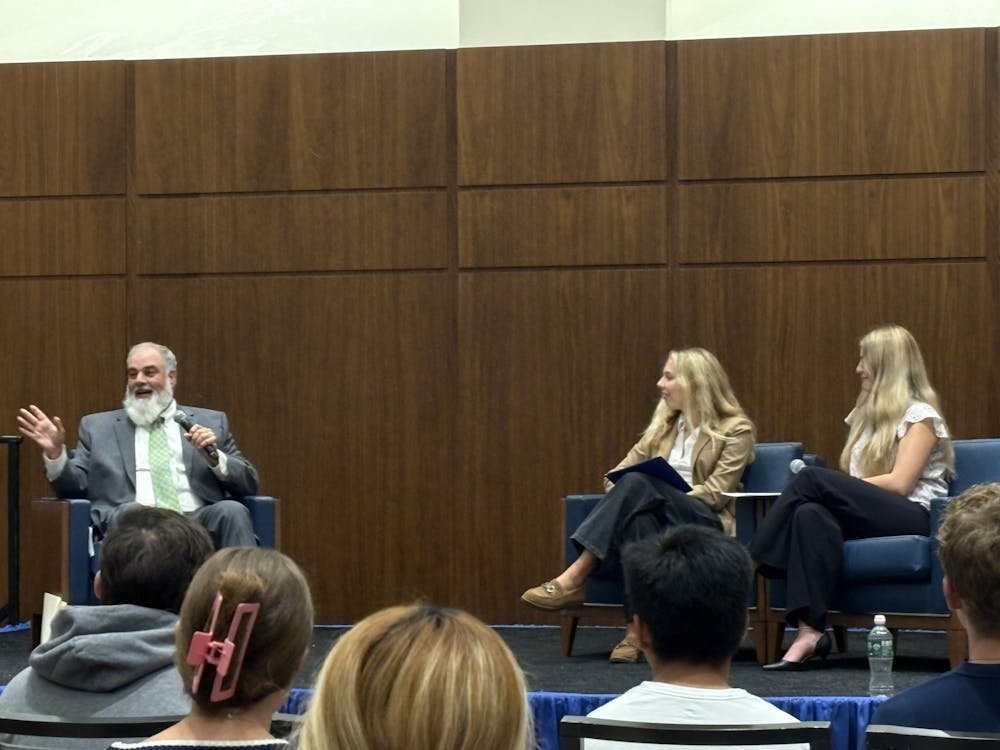On Sept. 17, the Pre-Law Society, the Pre-Professional Advising Center (PPAC), the Minority Pre-Law Society, and the Student Government Association (SGA) hosted judge Philip Degnan for Constitution Day.
Degnan currently serves as a superior court judge in Essex County, New Jersey, having been appointed by Democratic Governor Phil Murphy in 2020. Previously, Degnan was the comptroller of New Jersey from 2015 to 2020. After coming to Seton Hall for his J.D. from Arizona, he worked as a civil litigator and criminal defense attorney in Newark. After which, he was the assistant US attorney for the District of New Jersey from 2004 to 2011. There, he served four years as the executive director of the state Commission of Investigation until he was appointed state comptroller in 2015.
The current superior court judge spoke on his journey in the legal field and the relevance of the Constitution's principles to modern society.
The collaboration event welcomed pre-law students and prospective students to Bethany Hall for an interview directed by moderators Julianna Greco and Gianna Pietropaolo, two students who work in the pre-law office at SHU.
Gianluca Fortunato, a sophomore business administration major in the 3+3 law program, thought that since it was Constitution Day, it was important to attend.
“I’ve always found law interesting and to have the experience to talk to a superior court [judge] is just invaluable,” Fortunato said.
Fortunado said he is looking forward to a career in law.
“I feel as though just being here, gaining valuable insight from someone who actually has experience is pretty important,” he said.
Luz Muniz, a sophomore in the psychology 4+2 program representing SGA, said that was a big reason why SGA attended this event. As young adults “becoming independent in this world,” she believes “it’s really important that we do know our rights and know what protections that we’re entitled to in the Constitution.”
“It’s really important that we make sure that people can vote for their rights and know what their rights are,” Muniz said
Members of SGA attended to check if students were registered to vote, as well as to raise student awareness of their rights.
“We’re in a competition right now with all the schools in NJ, and we won four years ago for student registration and we’re trying to win again,” Muniz said.
Degnan reflected on how post-graduate life in the legal field evolved for him.
“That’s the most important part about a JD,” Degnan said. “It can open doors you never thought possible.”
Degnan explained how being a lawyer makes you become a resource to others, but that can sometimes invade the personal.
“You have to find a way to block off those cases from your personal life,” he said. “I’m not throwing the ball, I’m not making the pitch—I’m just trying to make sure the playing field stays level. ”
To do that, Degnan relentlessly leans on the Constitution.
“Everything we do is somehow tied back to the Constitution,” he said, describing its roots in the legal world. “The constitutional [rights] set the floor.”
Even though state rights could explore more, they still could not overpower the constitutional rights, Degnan added
Degnan also showed transparency about students anticipating entering a field in the backdrop of Artificial Intelligence (AI).
“AI is going to affect the profession, it already has, [but] you still have to be able to take [your work] and make sure it’s well done…now is the time to focus on those skills. But [AI] will never take the place of a good creative advocate applying the facts that they have,” Degnan said.
Our personhood is what Degnan sees as the most useful legal tool. Being a lawyer will always involve some level of interpersonal relationships
“You can argue hard in the courtroom, and then you can go outside the hallway and have a rational, reasonable conversation with the other attorney and maybe work something out,” Degnan said. “If you don't have that interpersonal skill, you might not get a good result for your client.”
Salma Ausman, a freshman in the political science 3+3 program, came to see Degnan for his “broad but detailed” experience.
“Especially for someone who is just starting in their law journey, this is exactly what I was looking forward to,” she said.
Ausman said she was moved when Degnan described how he did not see wins in court as a “notch on his belt.”
“I felt like that showed a more human experience and more human perspective to being a prosecutor that I don't think we see often. I think there’s [typically] almost “victory” in putting people behind bars,” Ausman said.
Shelby Karma, a freshman diplomacy and international relations major in the 3+3 program, also empathized with people in the justice system, like Degnan. She noted his points on “vicarious trauma” from working with these cases.
“Someone's life is literally in your hands,” Karma said, emphasizing how careful someone in a position as powerful as a judge must be.
In order to be confident in standing by one's decision, one must know one's own rights and know who to lean on.
“We’re living in a very tumultuous time, so knowing your basic rights is really significant,” Karma said.
Rhyleigh Russell is the Head Editor for The Setonian’s Features Section. She can be reached at rhyleigh.russell@student.shu.edu.





